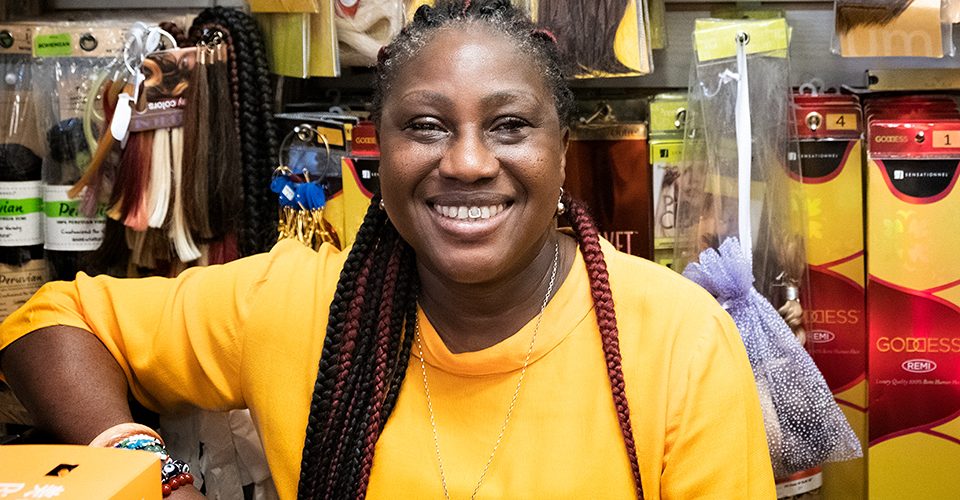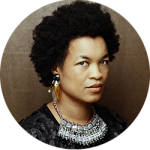When in 2002 I had finally run out of the stash of haircare products I’d lugged across the Atlantic in our move to Sweden, nicknamed the “Betty Fjord clinic” by a friend, and the long winter had taken its toll on my (then) frazzled relaxed hair, a new friend recommended I swing by “Vivat’s”.
“What’s that?” I said.
“Vivat’s” is actually VISON’S BUTIK, a fixture on Södermalm in Stockholm since 1998.
Vivat Ola Arvidsson came to Sweden from Sierra Leone in 1992, opened her store in 1998, and in the true entrepreneurial spirit of Madam CJ Walker, has made and sustained a successful business catering only to the needs of her community. The Afro-Swedish community.
Vison’s Butik has everything for the care and grooming of Afro hair and has been found in exactly the same spot on Repslagargatan 6, Stockholm since it first opened it’s doors. This was a huge milestone for local people of color – and really, anyone else with curly hair – living in Stockholm. Before Vivat (and internet shopping), there was a lot of bringing back stuffed suitcases from trips abroad, trying to calculate how much you would need until the next trip to Lagos, London, Paris, New York, or any other place with an appreciable sized black population.
Vivat is a fount of knowledge of all things hair-related. As I sat there waiting for 5pm, the store’s closing time on Saturdays, customer after customer came in asking questions. From what type of hair is best to use for a certain type of braiding; box braids vs twists; the difference between “Expression vs Impression” hair; what’s good for crochet…
I learnt that I, in my (since) natural-because-I’m-way-too-lazy-have-no-patience-and-can’t-be-bothered-ways am completely clueless in the vast range of choices available for afro hair. Who knew there was a special hair sponge guys used to get their do, did? I was quite happy sitting in Vison’s clocking some knowledge, so that the next time Sam (our editor-in-chief and resident stylist) sends me to get hair for a shoot, I won’t pretend I know what she’s talking about then go and stand in the middle of the store like a big question mark.
Even as Vivat closed the boutique late in order for us to sit down and chat, every five minutes or so, a new customer turned up at the door, nose pressed against the glass, pleading to be let in for that last minute important buy.
Hair, Hair, Hair
How has the business for black hair and black hair products changed, between 1998 and now?
It has changed a lot. It’s very, very big now. When I started in 1998, I could sit without a customer for a week. And today I don’t even have time to eat. That’s how big it has become, the whole industry in the world. It has changed dramatically in Sweden because everybody is about hair, hair, hair.
And what is it about hair, you think, that everybody is after now?
People want to identify themselves. It is very important for them today to bring out their culture. Hair defines us. And everybody wants to look good in their hair. People are starting to say “I like my hair”, even little girls. They want to show their identity via their hair.
You’ve made a big difference in the community. Did you start out trying to make a difference on a personal level?
I started to make a difference because when I came to Sweden, I tried to see and understand what was happening. I looked for a job, and I got a job but it was temporary, and then I was thinking… “Am I going to be a cleaner?” No. “Am I going to do something I don’t like just because I have to?” No. I was already 35 years old, I’d been a police officer in my country and I was checking to see if I could become a police officer in Sweden. But it would take years for me to do the police course here. One day, they called me in at the job and told me they were going to sell the company. I was worried about what I would do, then I started thinking “ Oh My God! Hair. Food. Clothes for African People!” Then I started researching, traveling to America, London, Paris to see what people were doing. Then I came up with the idea of doing my own line. I contacted China, and did it, but it was a flop because they sent me the wrong product. And then I thought “ Oh, Taj Mahal (a store that sells “ethnic” foods and products in central Stockholm) is the only one. I have to do something for my community. Because as a woman, I want to do my hair; my daughters hair, I want us to look good, so why not do something that has to do with hair. So, I went to London and bought hair and rented a stall in Skärholmen (a weekend flea market which is like Stockholm’s Portobello) to test if my business idea would work. Also to see if it was something for me or not.
Starta eget
Then I applied for Starta Eget (Swedish small business support program) with Arbetsförmedling (state-run employment agency) which by that time had started for women. I was the only black. At first I got a bakslag (setback) as the woman in charge singled me out and berated me saying I was not going to get the money because she thought blacks only took the money and ran away. But I had my vision, I knew what I was looking for and I wanted to make a difference in my community by breaking the chain of perception that the larger Swedish society had of black people, especially black women. That also involved changing the way we looked. For example, people had braids at the time, but everyone had the same style of braids. I thought, “No! This is not us. We love hair. We can style. We love to look good.” So, that’s what got me into it.
What advice would you give to younger people coming up who want to start their own business? What is it that you learnt that made it work for you?
You have to be strong. You have to be stubborn. You have to go to school for business. In Sweden, you have to do business the Swedish way, which is totally different than say, doing business in London. You have to separate your personal and business finances. You have to put in the time and take it really seriously. Open when you say you’re going to open. But also, trust yourself and the people with whom you work. All this is very important in business. It was very tough in the beginning, sometimes there was nothing to eat as everything went back into the business. You have to have patience.
Are you optimistic about the future? Black people are finally coming out of the shadows and taking their place here. Like you said before, looking for and finding our identity. How do you see the changes that’s been happening and how do you see us moving forward in Sweden?
I think we have to love ourselves more. We have to bring our money to our community. We have to! It’s the only way to face those challenges. If we don’t, we will continue to be in the same boat that we’ve always been. If we keep giving to people … like you heard just now, somebody saying “It’s expensive”. She doesn’t know what she’s talking about. They believe that black people are cheap, and I don’t see black people as cheap. Meaning it’s easier for people to come and try to bargain with us. I know we know quality. We love good stuff. We teach people about style, how to buy things, etc. Like she’s telling me 19kr is expensive for a razor blade, but after taking out 25% VAT, what is left for me? This is why some people fail in business, because they are afraid to set the prices they need to sustain a small business.
We need to prove ourselves. But if we love ourselves, and bring our money to our communities, support each other and see ourselves for who we are, then we can face anything.
This brings us to the Afro Hair and Beauty event on 26th August at Birkagården, Karlbergsvägen 86B, Stockholm. How long has that been around?
We started it in 2016. Afro Hair and Beauty conference is something that I’ve been going to in England for the last ten years or so. It teaches us more about ourselves. When we meet, we identify ourselves, we bring our hair out. We talk about our hair, our culture, our food (African and Caribbean food is always there). There is the mix of men, women and children. It’s not just for one group. Everytime I go there, I think “why not Sweden?” So, I decided it would be good to bring to it Sweden. My partners this year are Mayimuna Carlqvist and Hugosson Miller.
Give us a preview of this year’s program.
We’ll have about 7 different product manufacturers coming to do demos and presentations. There won’t be enough space to do a runway show, but people like Mixed Chicks among others will be showcasing their products on models. There will also be an author who writes African books for children. There will be makeup artists demonstrating how to do makeup for black skin. Jamaican food by Back-A-Yard. A distributor of leather sandals from Africa, and another doing juice from the Caribbean will also be there. So it’ll be a mix of everything.
Next year is Vison’s Butik’s 20th anniversary. We look forward at least another 20 years more!
-words & images ANDREA DAVIS KRONLUND





